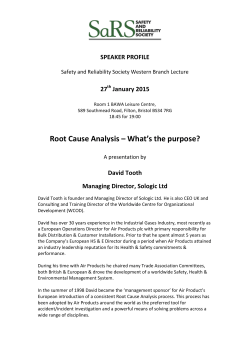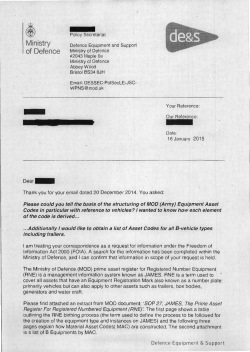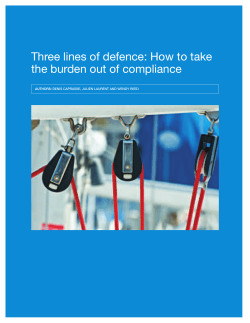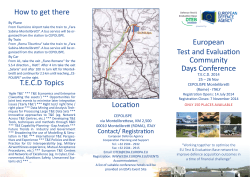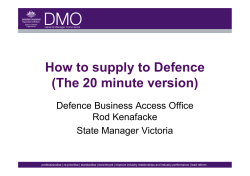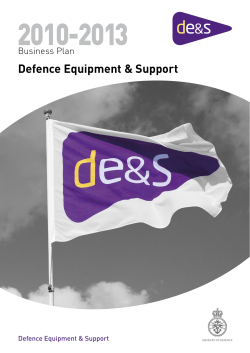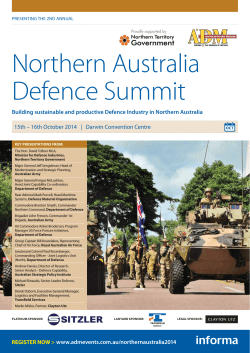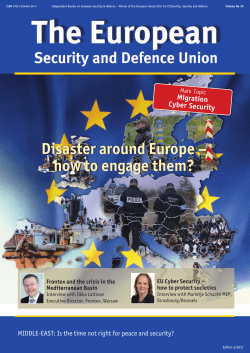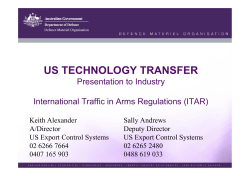
Joint Workshop Theme: “Affordability, Value for Money and Decision Making”
Joint Workshop Theme: “Affordability, Value for Money and Decision Making” Tuesday 18th November 2014 The BAWA Centre, Filton, Bristol, BS34 7RG We are delighted to announce a workshop being held jointly by SCAF and the Operational Research Society Defence Special Interest Group. The overall theme for the workshop is “Affordability, Value for Money and Decision Making”. The workshop will be free to attend for all members of SCAF or the OR Society. Affordability, and Value for Money are some of the key elements in today’s Decision Making process. Whether we are considering investment in a new capability, transition programme or optimising in-service support services – the issues remain the same. But do we understand what they mean? How do we do the assessment and evaluation? How do you make an appropriate judgement? What are the key critical components to examine? 09.30 Registration and Coffee 10.00 Welcome and Opening Remarks – Arthur Griffiths, SCAF and Alan Robinson, ORS DSIG 10.15 Keynote address - Syd Morley, Head of Scrutiny and Analysis, Ministry of Defence 10.45 “Strategic thinking – and the need for decision making tools without stovepipes” - Dr Dave Exelby, Managing Consultant, Decision Analysis Services Ltd Strategy is a journey. At the outset, stakeholders need to be able to explore a wide range of potential options. Rightly, these still need to be assessed against benefits, costs and timeliness but precision is usually not the issue at the earliest stage – rather the need to be able to articulate, communicate, compare, debate and evolve these options rapidly. The types of strategy problems could be defence capability development challenges, long term budget forecasting, and equipment pipeline futures. Traditional stove piping of analysis (cost, OA, project management) to support these decisions does not work well at the start of the strategy process. DAS has spent many years supporting senior stakeholders to create novel toolsets that are cross disciplinary in nature – providing “right-sized” models to support the process above. We will show examples that incorporate a wide range of domains including decision sciences, simulation, cost forecasting, economics and systems thinking. These include a study that provided option cost and benefit analyses in near real time at the start of a defence equipment acquisition, alternative futures for national defence, and equipment portfolio management. Finally we will reflect on their success and provide our views on the challenges that remain. Joint Workshop Theme: “Affordability, Value for Money and Decision Making” Tuesday 18th November 2014 The BAWA Centre, Filton, Bristol, BS34 7RG 11.25 Coffee break 11.40 “The use of cost data in support of whole Force analysis” - Arjun Madahar, Defence Science and Technology Laboratory The Ministry of Defence is responsible for planning a future Force Structure that balances UK foreign policy with financial realities. It is a complex issue involving interlinked capabilities, future predictions of the national security situation and UK industrial sustainment concerns. Senior Force and Capability Planners must therefore make decisions on adjusting the balance of funding between capability areas to reflect the requirements of an evolving and dynamic Defence and Security environment. This presentation discusses the uses of a suite of tools that provide differing but complementary insights on the capability, capacity and affordability of proposed Force Structures to meet UK Defence and Security policy and help identify Force Structures that are both affordable and offer value for money. 12.20 “Factoring in the cost factors that are the least controllable” - Andy Nicholls, Principal Consultant, PRICE Systems The high level costs normally associated with force mix studies and ‘capability’ modelling at a Strategic and occasionally Tactical level are often reduced to ‘single figures’ per hour or day of operating the individual systems concerned; this usage as a comparator may help in determining a particular option or force mix but for individual project or programme estimation where additional details is required, such high level numbers are inappropriate. If detail multi-year models are used as a basis to construct single figure high level numbers for Strategic modelling in association with Operational models the choice of escalation, currency exchange rates and purchasing power parity (PPP) factors assumes a much greater importance as future escalation and mixed nation supply may provide misleading results if not properly dealt with. This paper reviews how cost estimates for Platforms and/ or Systems that often have to cover many years of acquisition and in service life of may be influenced by choice of escalation, currency exchange rates and PPP factors and illustrates with some examples. 13.00 Lunch Joint Workshop Theme: “Affordability, Value for Money and Decision Making” Tuesday 18th November 2014 The BAWA Centre, Filton, Bristol, BS34 7RG 13.45 “Requirements uncertainty analysis, defining, measuring, mitigating and optimising” - Andy Nolan, Lead Engineer, Rolls-Royce In the development of complex systems the requirements for the system will almost always remain uncertain late into the development. In gas turbine engine control systems at Rolls-Royce, typically 50% of requirements will change between Critical Design Review and Entry into Service. Ignoring or not planning for requirements uncertainty will cause scrap and rework that will manifest later in the project. This presentation evaluates the impact of not managing these uncertainties and describes how Rolls-Royce uses Requirements Uncertainty Analysis to reduce this impact. The paper summarises the findings from an extensive Six Sigma study into requirements uncertainty and provides an overview of the technique now used to identify and monitor uncertainty through a project life. The return on investment of this technique has been between 100:1 and 500:1. 14.25 “Management information toolset to support evidence-based decisions for Defence Evaluation Capabilities” - Steve Rowley, QinetiQ UK defence programmes spends upwards of £1Bn a year on test and evaluation activities and facilities. In a rapidly changing world where defence must remain affordable and flexible it is important that timely and effective decisions are made on having the necessary evaluation capabilities, whether owned or available to defence. The MOD is sponsoring an activity to develop a software toolset that will contain Management Information to inform decisions for future investment and support of defence evaluation capabilities. This presentation describes the challenges associated with the development of a simple but powerful toolset to conduct analysis of the evaluation requirements and capabilities in terms of potential gaps and future opportunities. The presentation examines how a very large input dataset can be reconciled using COTS software applications and how aspects such as data availability and data maturity can be represented in order to increase confidence to the decision maker. 15.05 Tea Joint Workshop Theme: “Affordability, Value for Money and Decision Making” Tuesday 18th November 2014 The BAWA Centre, Filton, Bristol, BS34 7RG 15.20 “Economic Value Chains: an innovative approach to analysing the cost impacts of decisions” - Colin Sandall, QinetiQ QinetiQ have developed an approach, using influence diagrams, to explicitly represent and quantify the factors that contribute to the economic impact of particular activities. A pilot study for the Centre for Defence Enterprise considered the economic impact of adversaries exploiting certain potential cyber vulnerabilities in a set of defined contexts. The Economic Value Chain (EVC) approach has proved to be a useful way to explore and quantify cost-related issues, and work is currently underway to both develop the methodology and apply it in different areas. This presentation will describe the background to the development of the EVC approach, and will provide an illustrative, unclassified, example of its use. The strengths of the approach will be highlighted, as well as the practical issues involved in its use by analysts and decision-makers. Finally, its place in a portfolio of modelling and analysis approaches will be discussed. 16.00 “Communicating complex cost estimates to senior policy-makers” Lucia Retter and Dan Jenkins, RAND Europe With limited time and a range of competing priorities to manage, policy-makers need evidence-based cost estimates to support their decisions. Policy-makers care about the big picture and want to understand the linkages between various projects. However, they are often prone to falling into a conspiracy of optimism and can be fixated on single point costs. Oblivious to the different biases and reluctant to account appropriately for risk and uncertainty, there is a risk that policy-makers misinterpret a cost estimate. Misinterpretation through poor presentation or misunderstanding may have significant consequences for projects schedule, or lead to cost growth later in the projects life or may influence decisions in a wider portfolio of projects. RAND Europe has long experience in preparation and presentation of complex cost estimates in naval, combat air and helicopters sectors to senior policy-makers in national Ministries of Defence in Europe and the US. Based on this experience, this presentation will provide a guide for both practitioners and senior decision-makers alike to both present and interpret complex estimates. More specifically, this presentation will outline the rationale for the need of good cost estimates in policy-making; sketch out and compare the different biases in cost estimation and in policy-making and present some good practice guidelines for an effective communication of cost estimates to senior decision-makers. 16.40 17.00 Discussion and wash-up Close Joint Workshop Theme: “Affordability, Value for Money and Decision Making” Tuesday 18th November 2014 The BAWA Centre, Filton, Bristol, BS34 7RG The Society for Cost Analysis and Forecasting was formed in September 1984 following a recognition of the need for a forum where those with interests and experience in cost analysis could meet and discuss problems and techniques. The formation was the initiative of the UK members of the International Society of Parametric Analysts with the support of the Ministry of Defence and The Royal Aeronautical Society. Due to the background and experience of the founder members, the Society has tended towards defence oriented industries, however, it is the intention to cover as broad a field as possible. The objects of the Society are to promote the best interests of its members and to improve and disseminate knowledge of cost analysis and forecasting methods. SCAF is a not-for-profit organisation and has no political affiliations or commercial bias but encourages sponsorship by organisations with declared mutual interest. The aim of the Operational Research (OR) Society Defence Special interest Group (DSIG) is directed towards the practical and theoretical development of Defence related OR and the promotion of a wider knowledge and appreciation of Defence related OR. The group also seeks to encourage interaction between Defence related and non-Defence related OR. The group was formed in 1997 to provide a ‘home’ for all those involved in Defence related OR: customers and suppliers, practitioners and academics should be involved both as talkers and listeners. Meetings are held to consider both techniques, and wider discussion of the role of OR in Defence. The group holds meetings two or three times a year and has strong links with the International Symposium on Military Operational Research (ISMOR). Joint Workshop Theme: “Affordability, Value for Money and Decision Making” Tuesday 18th November 2014 The BAWA Centre, Filton, Bristol, BS34 7RG Registration and Costs Registration and coffee will be available from 09.30. The Workshop will commence at 10.00. The workshop is FREE to ATTEND for members of SCAF and the OR Society. Non-members are welcome to attend at a cost of £120.00 per delegate. A 10% discount is available for group bookings of more than 4 delegates and a 15% discount is available for group bookings of more than 10 delegates. These costs include all refreshments, a buffet lunch and FREE membership to SCAF and attendance to all future SCAF organised events until August 2015. Please reserve a place for me at the SCAF workshop being held on Tuesday 18th November 2014 at the BAWA Centre, Filton, Bristol commencing at 10.00am. I am a current member of SCAF I am a current member of the OR Society I enclose a cheque (payable to SCAF) for the amount due. Please forward cheques to:- Mr D Hedley, SCAF Treasurer, C/O BMT Reliability Consultants Ltd, 12 Little Park Farm Road, Fareham, Hampshire, PO15 5SU Please invoice me Receipt Required Name: ……………………………………………………………………………………………………………….. Company: ………………………………………………………………………………………………………….. Address: ……………………………………………………………………………………………………………. ……………………. ……………………………………………………………………………………………………... Tel: …………………………………. Email:…………………………………………………………………….. Nationality: ………………………………………………………………………………………………………… Dietary Requirements: ……………………………………………………………………………………… To register, please email: ndmorrill@dstl.gov.uk or call 0306 7703450 by 14th November 2014
© Copyright 2025
